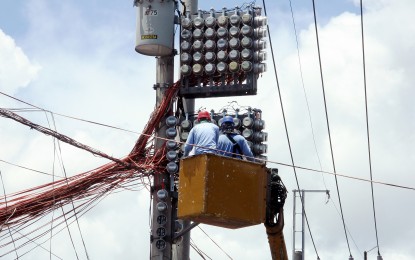
METER CHECK. Manila Electric Company linemen inspect meters and a power transformer on a concrete post along Cogeo Avenue, Antipolo City on May 29, 2021. Some parts of Luzon experienced rotational power interruptions from May 31 until June 2. (PNA photo by Joey O. Razon)
MANILA – The country’s power capacity has increased by 30 percent since the start of the Duterte administration.
In a Palace briefing Thursday, Department of Energy (DOE) Secretary Alfonso Cusi said the agency continues work on capacity building and has plans until 2040 to ensure that the country will have a sufficient supply of electricity.
“We have built a capacity (of) more than 30 percent since we assumed our jobs,” he said, adding that the country is not reliant on just one source of energy but is exploring proper energy mix.
Cusi said the rotational brownouts experienced in the past days were due to the breakdown of power plants with a total capacity of more than 2,000 megawatts.
The Luzon grid was on red alert status for three days since Monday.
Earlier, the DOE attributed the cause of the red alert status to unplanned outages of power plants and increased power demand due to higher heat index.
For every one degree Celsius increase in the heat index, 100 MW is added to the power demand.
Cusi reiterated that the DOE has been proactive in its policies to avoid insufficient power supply.
Among those are prohibiting maintenance in April, May, and June when the dry season is at its peak, except for hydropower plants; securing firm contracting for ancillary services which build the backup when there is a breakdown in power plants; lifting the moratorium on exploration in the West Philippine Sea; and exploring other sources of energy like nuclear and hydrogen as the energy of the future.
“When there is a breakdown (in power plants), (it’s) not within our control,” he said.
Cusi added that the National Grid Corporation of the Philippines must secure ancillary services, which will be deployed as a backup if there will be unplanned outages of power plants.
“We need to establish the required reserve,” Cusi said. “The public can count on DOE that we are on top of these things.” (PNA)
